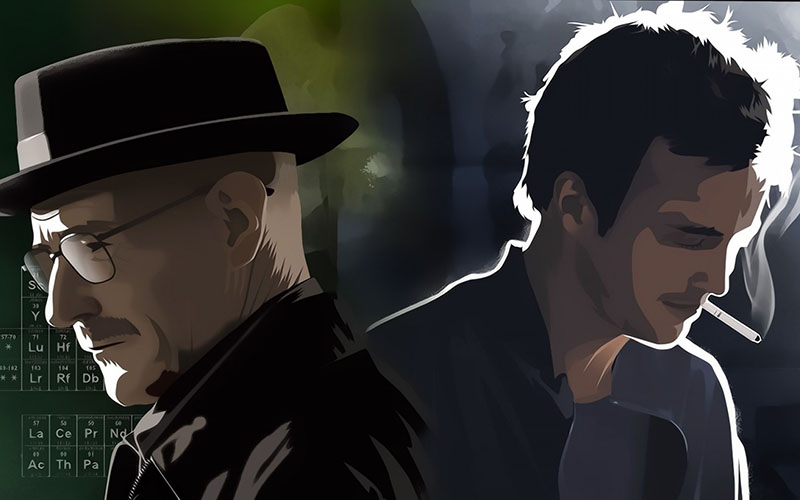Beware: spoilers ahead.
“To provide for his family’s future after he is diagnosed with lung cancer, a chemistry genius turned high school teacher teams up with an ex-student to cook and sell the world’s purest crystal meth,” is the summary provided by IMDb for one of the most critically acclaimed dramas in television history. However, its description may make you laugh. The premise just seems ridiculous. How could this show have become so huge?
“Breaking Bad” (a southern euphemism meaning to challenge conventions, defy authority, or simply to go wild and raise hell) has enjoyed massive success in its final episodes, but it wasn’t always this way. Virtually nobody had any idea what “Breaking Bad” was when its pilot aired five years ago. Most critics gave the show negative reviews and quickly dismissed it as another show that’ll be cancelled within its first season. Many drew comparisons to “Mad Men,” another very successful AMC original series, including the San Francisco Chronicle, who said, “It’s one thing to get intoxicated on the lush beauty of “Mad Men” and quite another to watch a desperate, dying man cook drugs in his underwear while wearing a gas mask.” It’s my educated guess that this reviewer lost his job after “Breaking Bad” beat out “Mad Men” for Most Outstanding Drama Series at the Emmys.
It wasn’t long before critics began to take notice of “Breaking Bad”. Bryan Cranston, known for playing Malcolm’s dad on “Malcolm in the Middle” before portraying a meth kingpin, won an Emmy for Outstanding Lead Actor in a Drama Series three years in a row in 2009, 2010, and 2011. “Breaking Bad” entered the Guinness Book of World Records due to its rating of 99/100 on Metascore. Unfortunately, the show still hadn’t clicked with audiences. The show was lucky to get 2 million viewers for its season finales, while its AMC counterparts “Mad Men” and “The Walking Dead” gained anywhere from 6 to 12 million viewers every week.
However, it was around the summer of 2012 when things began to change for the show: “Breaking Bad” made its Netflix debut. The few people that watched “Breaking Bad” raved about the show, and now Netflix gave the seriously annoyed friends of said people a chance to finally watch it so said people can shut up. Then they were hooked, and proceeded to annoy their other friends about watching it. This process repeated itself until “Breaking Bad” became, not only one of the most critically acclaimed dramas on television, but most universally acclaimed dramas on television. It seemed that “Breaking Bad” was a drug, even more addicting than Heisenberg’s crystal blue. Although it came late in the series (and by late I mean that it’s currently over), “Breaking Bad” fans everywhere are rejoicing in its enormous success.
If to “break bad” means to challenge conventions, then it’s an extraordinarily fitting title. “Breaking Bad” has defied nearly every television convention, including its most prominent difference as opposed to other shows: the transformation of the main character. Never before has a show turned its main character, the good guy, into the bad guy. When we first meet Walter White, he is a prideless, spineless, underachieving high school teacher diagnosed with terminal lung cancer (without even ever having touched a cigarette.) Oh, and he has a son with cerebral palsy. However, by the end of the first half of the fifth season, Walter White is a prideful, egotistical, cold-blooded child-poisoning murdering drug kingpin. Gilligan claims that he turned “Mr. Chips into Scarface.” And although we see a part of the original Walter White we once sympathized with in the series finale, the transformation could not be undone.
The epic series ended on September 29, and feedback was extraordinarily positive. Gilligan made a point not to leave anything ambiguous, and to tie up every loose end. He held up his end of the bargain. There was no cut-to-black Sopranos-esque ending: just a final shot of a motionless Walter White to surprisingly uplifting music. The ending of the series has left fans clueless as to how to spend their newly acquired free time. Luckily for fans, a spinoff series based on the earlier life of supporting character Saul Goodman titled “Better Call Saul” will be starting production soon.
“Breaking Bad” will go down as one of the darkest, most intelligent and most unique television programs of all time. It will be hard for all of the show’s diehard fans, including myself, to move on. But hey, the complete series comes out on DVD November 26.















